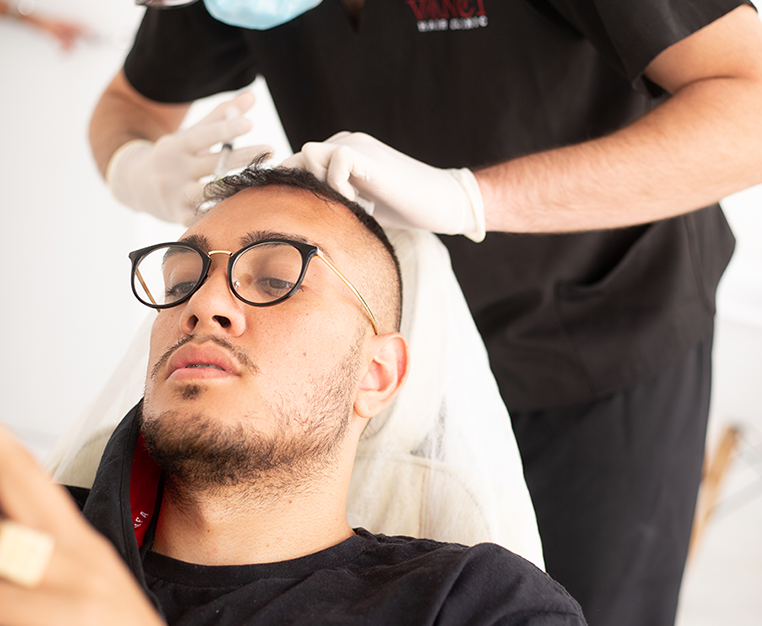You probably scratch your head more than you realise. For many people, head-scratching is an involuntary and unconscious process. However, for others, it may be an early sign of mild dandruff or scalp infection. An itchy scalp is relatively common in men, women and children and is known as scalp pruritus in medical terms. How can you tell if an itch is just an itch or something else is going on? In this blog post, you’ll learn about itchy scalp, how to recognise it and how to treat it. Read more to find out.
Does An Itchy Scalp Always Mean Hair Loss?
It’s not uncommon for people experiencing hair loss to have an itchy scalp at the same time. Between 50 and 100 strands of hair naturally fall out every single day. Itchy scalp and hair loss are independent occurrences, although science suggests a link between the two.
Fungal infections, reactions to hair products and hair follicle inflammation are hair conditions that can lead to itching scalp and sometimes hair loss.
Severe itching can also result from scarring on the scalp when scar tissue damages nerve fibres. The typical effects of repeated scratching can include bleeding, scabbing, and temporary hair loss. The great news is that once you treat the cause of the scratching and it stops, your hair will eventually begin growing back.
So, an itchy scalp does not always lead to hair loss if the cause of the itching receives treatment in time. If some hair loss occurs, it’s likely to be temporary, and any hair you lose due to the scratching will grow back within a couple of months.
Causes Of Itchy Scalp
Seborrheic dermatitis, typically known as dandruff is one of the leading causes of an itchy scalp. There are two key factors which lead to the formation of dandruff on otherwise healthy scalps. These factors are:
- Over-production of oils, i.e. sebum
- The presence of common fungi known as Malassezia
If you have a greasy scalp, your oil glands may become inflamed, leading to itching, skin reddening, and yellowish or white scales.
Malassezia grows naturally in the scalp’s oils, but when abnormal growth develops, the skin produces more oil than normal. Seborrheic eczema may develop as a result of this overproduction of oil by the sebaceous glands.
Other typical causes of dandruff include yeast growth on the skin, seasonal temperature and humidity changes and often stress. Anti-dandruff shampoos containing ingredients such as coal tar or salicylic acid are effective at treating dandruff. Antifungal creams may also provide some respite.
Skin Sensitisation And Allergic Responses
Changing hair care products or shampoo can result in a flaky and itchy scalp. If this comes on after you have started using a new product, immediately stopping will often resolve the issue. A build-up of shampoo residue on your scalp can also lead to a skin reaction and itchy scalp. Resort to all-natural hair care products and rinse thoroughly after every wash.
Another common trigger of scalp reactions is contact dermatitis common with frequent hair colour changes. Para-phenylenediamine (PPD) is an ingredient in hair dye products which is largely responsible for allergic reactions. Always read the label and avoid anything containing this ingredient. Also, stay away from hair care products containing artificial fragrances and harmful chemicals to prevent scalp reactions.
Treating Itchy Scalp Naturally
Mild scalp irritation and itchiness often resolves with little requirement for medical intervention. In most cases, switching back to a hair care product you are used to is often all you need. However, if itching and redness persist, seek a dermatologist’s advice who can help diagnose the cause and prescribe treatment.
If you incline to seek a remedy with natural ingredients, here are some of the best treatments to try:
- Coconut Oil – contains copious amounts of lauric acid, which help the skin absorb moisturiser oil and soothe an itchy scalp.
- Cider Vinegar – the antibacterial, antifungal and anti-inflammatory properties of apple cider vinegar make it ideal for creating a neutral environment on your scalp. Use it to rinse off your shampoo by mildly diluting it with warm water. Use this regularly, and you will find your dandruff goes away too.
- Peppermint oil – has a cooling effect and calms down an itchy scalp. Mix it with a carrier oil such as olive oil and massage into your scalp before or after you shampoo your hair.
- Tea tree oil – possesses antiseptic, antimicrobial and antifungal properties that help alleviate the discomfort and symptoms of itchy scalp. Tea tree oil is a strong-smelling essential oil, which requires diluting with olive oil before massaging into your scalp. You can also infuse a few drops of the oil into your shampoo.
Worried About Itchy Scalp?
A dermatologist’s visit is always advisable if you are struggling to get rid of dandruff or an itchy scalp. Constantly scratching your scalp can have unintended consequences such as inflammation or hair loss. At Vinci Hair Clinic, our specialists are on hand to help with a variety of scalp concerns. Put your worries about itchy scalp aside by giving us a call and booking your appointment today.




